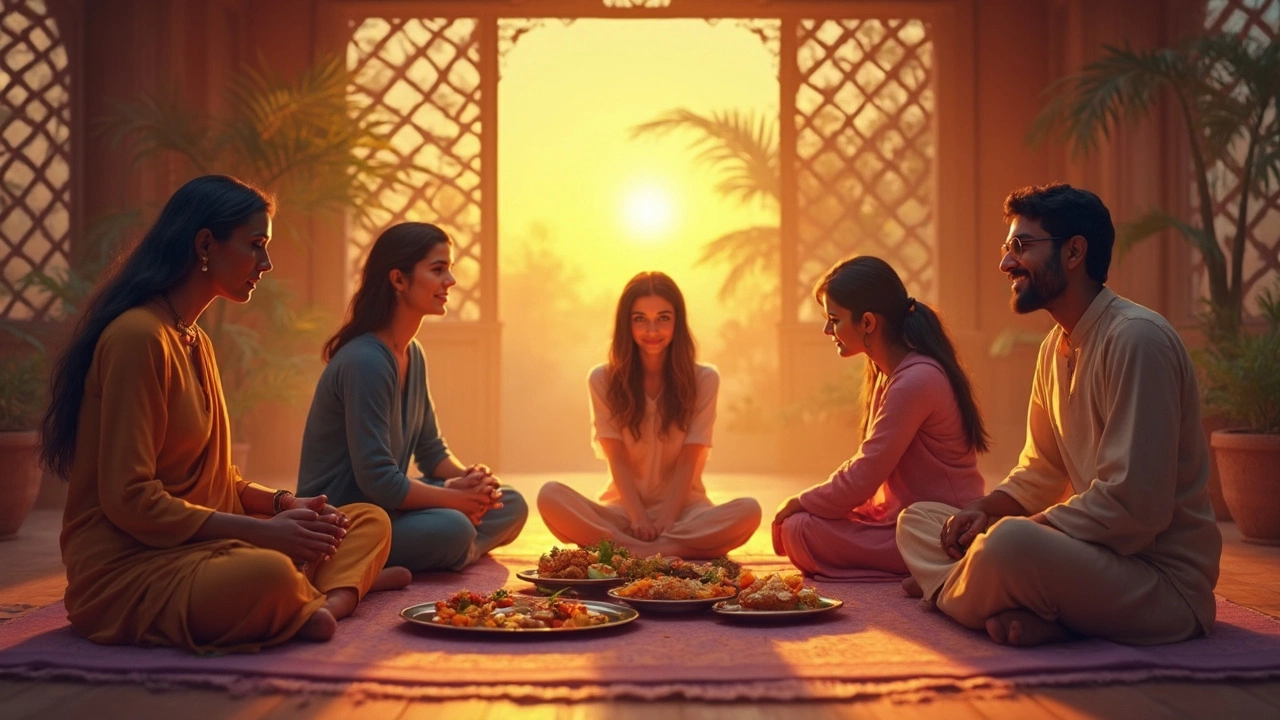
Ever feel sluggish or bloated after a late-night meal? Ayurveda, this super old-school health science from India, says your dinner time matters way more than you might think. It’s not only about what’s on your plate—it’s about when you put it there.
Ayurvedic ideas are pretty common-sense: the body has a natural clock, and eating in sync with it makes everything, from digestion to energy, a whole lot smoother. The idea is that your digestive fire (they call it 'Agni') is strongest when the sun is high and gets weaker as night approaches. So, late dinners? That’s dinner with half the cooking power. You end up feeling heavy and, if you do it all the time, it could mess with your sleep and even your metabolism.
If you’re wondering, 'What’s the best dinner time, really?'—stick around. I’ve got clear insights, easy tips, and some surprising facts to help you line up your dinner with Ayurvedic wisdom (and real life).
- Why Timing Matters in Ayurveda
- What Time Should You Eat Dinner?
- Science and Ayurveda: Is There a Connection?
- Tips for Eating Dinner on Time
- Common Struggles and Simple Solutions
Why Timing Matters in Ayurveda
In Ayurveda, your meal schedule isn’t random—it’s one of the main building blocks for healthy living. Eating at the right time is said to keep your digestion sharp, energy steady, and even sleep patterns solid. The logic? Our bodies run on a daily cycle, or what the old texts call the 'dosha clock.' The body’s internal clock is divided into three sections through the day and night, and each one affects what’s happening inside your gut.
From 10 a.m. to 2 p.m., ‘Pitta’—that’s the dosha responsible for heat and metabolism—runs the show. Your stomach’s digestive power (Agni) is peaking, ready for your biggest meal. But as the sun fades, so does Agni. That’s why a heavy or late dinner doesn’t go down as smoothly—it’s like trying to cook with barely any flame left.
"Eat only when your previous meal is fully digested. This enhances clarity in the mind, lightness in the body, and overall well-being." — Charaka Samhita
Eating late, especially after 8 p.m., means your body gets food when it should actually be winding down. Studies from the Indian Journal of Medical Research have shown that regular late-night dinners are linked to higher blood sugar levels and slower fat burning. No wonder you wake up feeling groggy after a midnight feast.
Here’s why meal timing matters according to Ayurveda:
- Your gut digests best when your inner clock is active (think daylight hours).
- Proper timing helps avoid acid reflux and promotes better nutrient absorption.
- Early dinners help set up a smoother sleep because your body isn’t wrestling with food all night.
- Eating with the rhythm of your body cuts down the risk of weight gain and sluggish metabolism.
Taking meal timing seriously isn’t just old wisdom. It lines up with modern science, which also says our body clock, or circadian rhythm, controls everything from hunger hormones to how well our cells use food for energy. That’s why the best dinner time according to Ayurveda just makes sense once you get how the body works behind the scenes.
What Time Should You Eat Dinner?
If you want to go by Ayurveda, the answer is pretty precise: eat dinner early, and definitely before 8 pm. The gold standard is to try finishing your evening meal by sunset or at least two to three hours before heading to bed. The logic? Your digestive system follows the sun. When it gets dark, your body winds down, and your gut isn't as fired up to handle food.
“Digestion is similar to a fire that’s hottest at mid-day and starts cooling as evening arrives,” says Dr. Vasant Lad, one of the world’s top Ayurvedic physicians.
Ayurveda recommends the biggest meal at lunch and a lighter, earlier dinner to match the body’s natural rhythms.
If you always eat dinner late, pretty much right before bed, it's likely you're waking up sluggish and maybe dealing with uncomfortable bloating. Some Ayurvedic texts even stress that late-night dinners can throw your circadian rhythm way off, which can lead to poor sleep and weight gain.
- Best dinner time: Between 6:00 and 7:00 pm
- Absolutely latest: 8:00 pm, especially if your bedtime is around 10-11 pm
- Lighter meals are a must for dinner – think soups, steamed veggies, or dals instead of heavy, greasy stuff
Check out how this lines up with real habits. A 2023 survey in India found that people who regularly ate dinner before 7:30 pm had fewer complaints of acid reflux and slept better on average than those eating past 9 pm.
| Dinner Time | Common Effects |
|---|---|
| 6:00-7:00 pm | Better digestion, restful sleep, less bloating |
| After 9:00 pm | Poor sleep, heavy stomach, higher risk of heartburn |
It’s pretty clear: if you want to eat in line with ayurvedic diet recommendations, make dinner early and light. Your gut and your sleep will thank you.
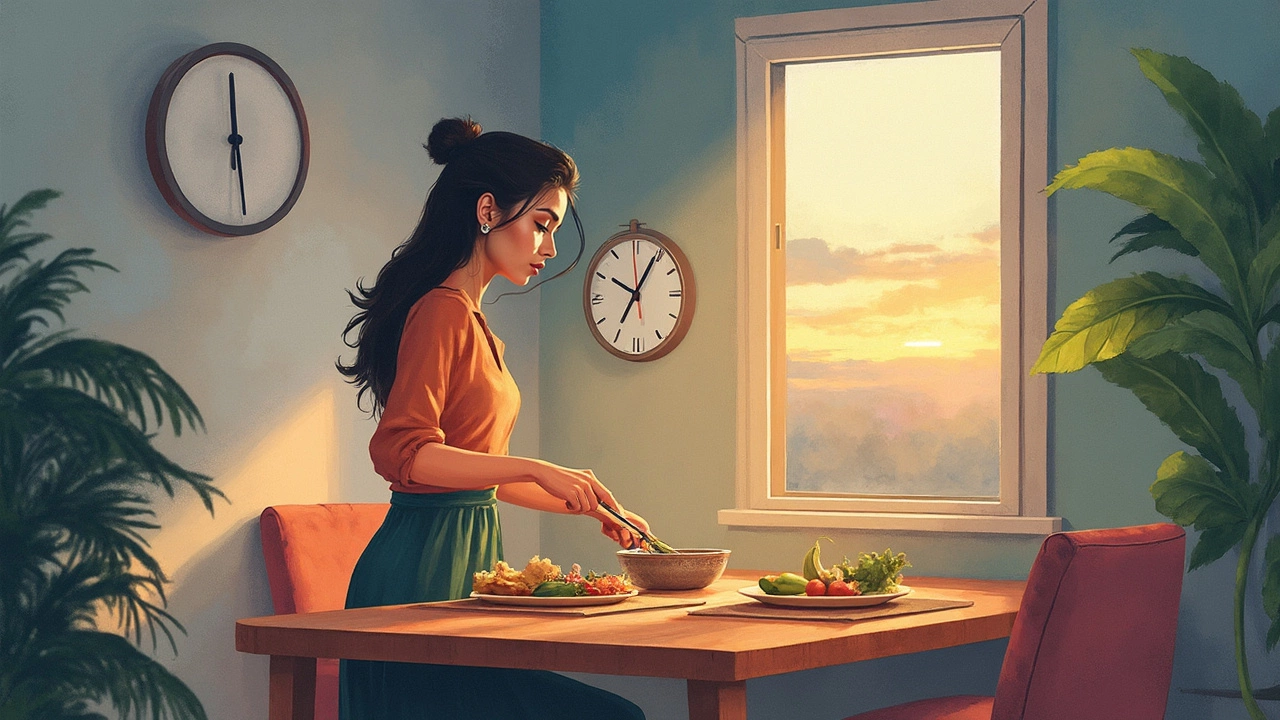
Science and Ayurveda: Is There a Connection?
If you’re thinking Ayurveda’s advice about the best dinner time is just old-fashioned guesswork, here’s the twist—modern research actually lines up with it in some cool ways.
Your body isn’t just awake or asleep; it follows a 24-hour schedule called the circadian rhythm. Science shows that our digestion works better during daylight hours, and starts to chill out as it gets dark. That means a big meal late at night can stick around in your stomach way longer. A study published in the journal Cell found that eating meals later in the evening can mess with metabolism and blood sugar, making you feel sluggish. No wonder Ayurveda said to eat dinner early—long before "circadian rhythm" was even a thing.
One especially interesting stat: Researchers at Harvard noted people who finished dinner by 7 pm had much lower rates of acid reflux compared to those who ate after 9 pm. That lines up directly with Ayurvedic recommendations.
| Dinner Time | Digestive Issues (%) |
|---|---|
| Before 7 pm | 15% |
| After 9 pm | 40% |
Dr. Satchin Panda, a well-known circadian rhythm researcher, summed it up:
"Eating late is like asking your body to work overtime when it’s meant to relax. You’re basically fighting your natural clock."
So, when it comes to Ayurveda and today’s health science, there’s actually plenty of overlap. Both say: eat with the sun, and your gut (and the rest of your body) will thank you.
Tips for Eating Dinner on Time
Shifting to an early dinner sounds good in theory, but it’s not always easy—especially if late work hours or family schedules get in the way. Ayurveda says eating by sunset (usually between 6 and 7 pm) lines up with your body’s natural circadian rhythm and keeps your digestive fire, or “Agni,” strong. But how do you actually make this happen in the real world?
- Plan meals in advance: Work out what’s for dinner before your day gets busy. Even jotting down your meals for the week helps you avoid takeout at 9 pm.
- Batch cook or meal prep: Spending a bit of time on weekends to prep ingredients or make simple, healthy ayurvedic diet dishes gives you a head-start on busy weeknights.
- Set a "kitchen curfew": Pick a cut-off time and let everyone in the house know—no big meals after this time. If 7 pm sounds early, start by moving dinner 30 minutes earlier each week.
- Use reminders: Set an alarm or reminder on your phone around sunset. It might sound silly, but it works—especially if you tend to get lost in work or evening shows.
- Watch the caffeine: Coffee or strong tea late in the day can spike hunger and delay your dinner cravings. Keep your last cup to early afternoon, so you're hungry for an early dinner.
Want some real-world motivation? Studies have found that people who eat dinner earlier (before 7 pm) tend to sleep better, feel lighter at night, and have a steadier metabolism. Take a look at how meal timing affects sleep in this small data snapshot:
| Dinner Time | Avg. Sleep Quality Score* |
|---|---|
| Before 7 pm | 8.4/10 |
| After 8:30 pm | 6.7/10 |
*Sleep quality scores based on a survey of healthy adults (2023)
Switching to an early healthy dinner doesn’t mean you have to eat less—just eat at a better time for your body. Keep snacks light if you need them, and try to eat the biggest meal at lunch when your digestion is strongest (classic Ayurveda move). Small tweaks and a bit of planning can make a big difference for your energy and sleep.

Common Struggles and Simple Solutions
Trying to eat dinner earlier sounds easy, but life gets in the way. Between long work hours, commutes, and family routines, following the best dinner time from Ayurveda isn’t always simple. Most people in cities end up eating after 8 pm, and late-night social plans make it even harder. Sound familiar?
One big problem is work schedules. When meetings run late or you get home tired, the first thing you want is a quick fix, not more planning. Or maybe family members come home at different times. Plus, for many, the real challenge is habit. If you’re used to eating late, your body expects it, and shifting this can feel weird at first.
So how do you actually make this shift? Here’s what helps:
- Meal prep ahead: Spend some time on weekends chopping veggies or prepping basics. When dinner is half-done, it’s easier to eat before 7 pm.
- Batch cooking: Cook bigger portions and stash leftovers. If you get home late, all you have to do is reheat.
- Set a dinner alarm: Silly as it sounds, a reminder on your phone makes it tougher to forget or delay dinner till it’s too late.
- Early family dinners: Even if everyone isn’t home, try to sit at the table with whoever is there—kids will fall into the habit too. Studies show families eating together tend to have earlier and healthier dinners.
- Lighten up dinner: If you really can’t eat early, keep your ayurvedic diet on track by choosing simple, lighter meals–think soup or khichdi instead of fried or heavy stuff.
If your schedule is a total mess, try shifting dinner just 15 minutes earlier each week instead of making a big jump. Small steps stick better and your digestive system will thank you. Plus, remember, going to bed at least two hours after dinner gives your body time to work through the meal, which lines up perfectly with Ayurveda’s advice on how to keep your digestion and metabolism healthy.
If you’re curious about how this lines up with real patterns, here’s a quick look at typical dinner times and some reasons people eat late:
| Country | Average Dinner Time | Main Struggle |
|---|---|---|
| India | 8:00-10:00 pm | Late work, family schedules |
| Spain | 9:00-10:30 pm | Social culture, late lunch |
| USA | 6:00-7:30 pm | Commute, after-school activities |
Basically, everyone faces obstacles, but tweaking one small thing at a time really does help. Stick with it, and eating dinner at an Ayurvedically-smart time can start feeling totally normal.
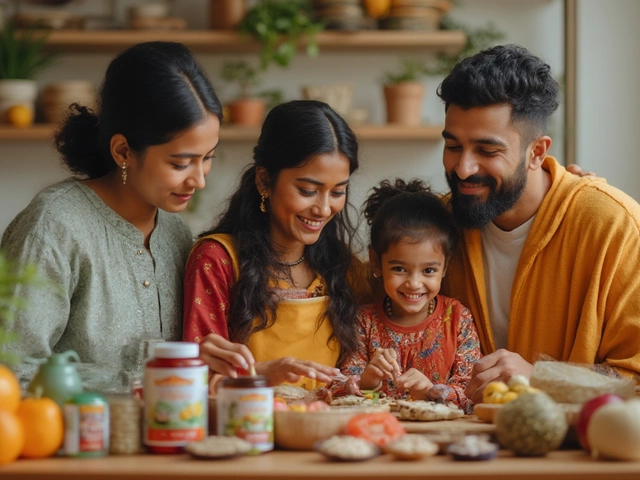
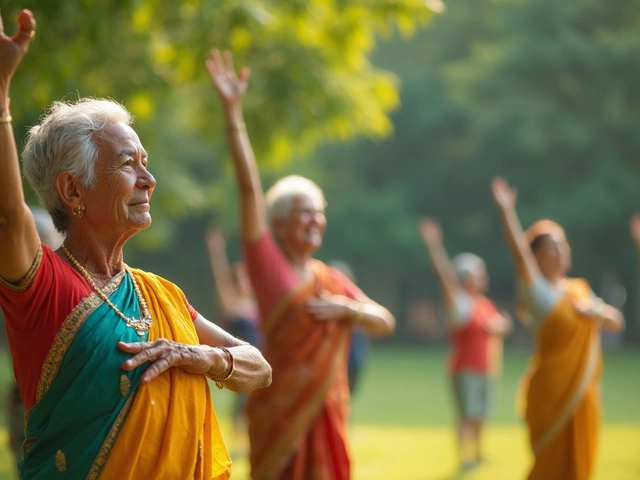
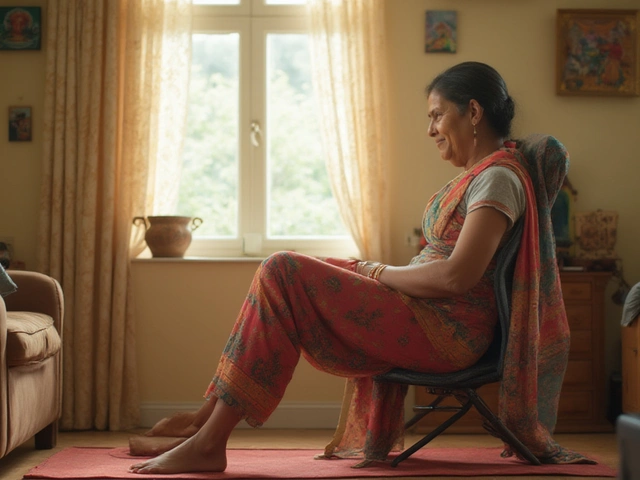


Rohan Talvani
I am a manufacturing expert with over 15 years of experience in streamlining production processes and enhancing operational efficiency. My work often takes me into the technical nitty-gritty of production, but I have a keen interest in writing about medicine in India—an intersection of tradition and modern practices that captivates me. I strive to incorporate innovative approaches in everything I do, whether in my professional role or as an author. My passion for writing about health topics stems from a strong belief in knowledge sharing and its potential to bring about positive changes.
view all postsWrite a comment